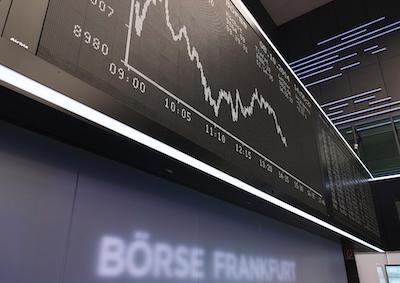Assets under management in the European fund industry fell about 13% in the first half of 2022 from €15.3 trillion to €13.3 trillion amid the global stock market rout, according to the Refinitiv European fund market review.
The Refinitiv report also covers markets outside the EU, including the UK and Switzerland.
The review said that while ETFs (exchange traded funds) held €1.2 trillion or 9.29% of the assets under management in Europe, the vast majority (€12.1 trillion, or 90.71%), were held by mutual funds.
It said fund products with an ESG-related investment approach account for €5.6 trillion or 41.92% of the overall assets in the European fund industry, while conventional funds account for €7.8 trillion or 58.08% of the overall assets.
“Given the current situation in the economies around the globe it was no surprise that the European fund industry faced declining assets under management over the course of the year 2022 so far, as the geopolitical situation in Europe, the still ongoing COVID-19 pandemic, disrupted delivery chains, increasing inflation, and interest rate hikes put some pressure on the securities markets …” said the report.
“The majority of assets were held by equity funds (€5.4 tr) followed by bond funds (€3.0 tr), mixed-assets funds (€2.4 tr), money market funds (€1.4 tr), alternative UCITS funds (€0.6 tr), real estate funds (€0.3 tr), ‘other’ funds (€0.1 tr), and commodities funds (€0.1 tr) …
“With regard to the market share of ESG-related products, one might be surprised that products with an ESG-related investment approach account for €5.6 tr or 41.92% of the overall assets in the European fund industry, while conventional funds account for €7.8 tr or 58.08% of the overall assets.
“Looking at these numbers, one needs to bear in mind that fund promoters in Europe have repurposed a high number of conventional funds to ESG-related funds to align their product ranges either with their in-house sustainability strategy and targets or with the market demand, since investors have shifted assets toward ESG-related products since after the introduction of the EU action plan to financing sustainable growth and the respective regulations …
“After the record inflows for mutual funds (2020 and 2021) and ETFs (2021) the European fund industry witnessed estimated overall net outflows of €185.0 bn year to date …
“Within this market environment and given the economic uncertainties, one would expect that European investors sold long-term funds and bought money market products.
“Therefore, it is somewhat surprising that European investors continued to sell money market products (-€129.2 bn) over the course of 2022 so far.
“The high outflows from money market products are somewhat surprising within the current market environment since these products are considered to be so-called safe-haven products.
“Therefore, this trend might be a hint that European investors want to protect their portfolios from the impact of high inflation rates.
“The same might be somewhat true for the outflows from bond funds, as bonds which have been issued during the low interest rate environment are not able to compensate investors for the high inflation rates.
“In addition, bonds are supposed to face losses from the shift in central bank policies around the globe.
“As for the above, it was no surprise that long-term funds faced estimated net outflows of €55.9 bn.
“While mutual funds (-€240.1 bn) faced estimated net outflows, ETFs enjoyed inflows of €55.1 bn over the course of 2022.
“The inflows into ETFs within this market environment repeat a trend we witnessed over other rough market periods such as the financial crisis or the euro crisis, where ETFs enjoyed inflows while mutual funds faced massive outflows.
“The current investor behavior shows that European investors are somewhat in a risk-off mode.
“Taking a closer look, mixed-assets funds (+€34.6 bn) were the asset type with the highest estimated net inflows overall for 2022 so far. It is followed by equity funds (+€11.7 bn), real estate funds (+€8.4 bn), “other” funds (+€1.3 bn), and commodities funds (+€0.2 bn).
“Meanwhile, alternative UCITS funds (-€5.4 bn), bond funds (-€106.6 bn), and money market funds (-€129.2 bn) faced estimated overall outflows for the year so far.”
